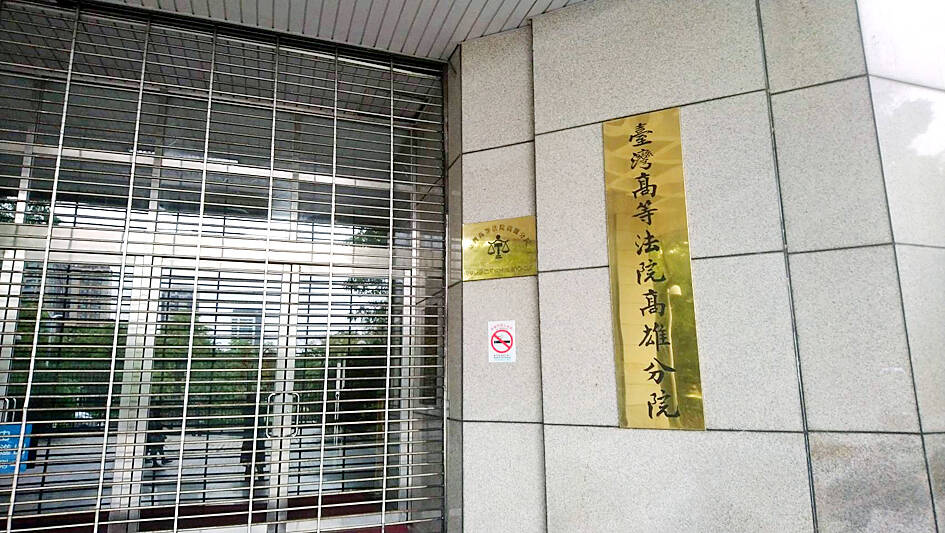The Kaohsiung branch of the High Court yesterday ruled that state compensation should be paid for the accidental death of a Chinese tourist, as citizens of the People’s Republic of China are regarded as Republic of China (ROC) nationals under the law.
The Kaohsiung City Government should pay NT$4.63 million (US$152,283) to the family of the man, surnamed Qian (錢), the court said.
The ruling can be appealed.

Photo: Pao Chien-hsin, Taipei Times
Qian was electrocuted to death by a malfunctioning street light while cycling in Kaohsiung’s Lujhu District (路竹) during a round-the-island biking tour in August 2018 — a fact that the city government does not dispute.
The family sued the city for wrongful death and demanded NT$11.65 million in compensation for pain and suffering, loss of income, funeral costs and other expenses.
Foreign nationals can receive reparations for government negligence resulting in death or injury if a reciprocal arrangement exists between Taiwan and their country of origin, the branch’s first civil court president Ning Hsin (甯馨) said, citing the State Compensation Act (國家賠償法).
The claims made by the deceased’s family would have been rejected, as there is no reciprocal agreement between the Taiwanese and Chinese governments, but the laws accord a special legal status to the latter, she said, referring to the Act Governing Relations Between the People of the Taiwan Area and the Mainland Area (臺灣地區與大陸地區人民關係條例).
The court requested clarification about the State Compensation Act in reference to the Qian case from the Ministry of Justice and the Mainland Affairs Council, which issued an official statement saying Chinese citizens are deemed ROC nationals under the law, Ning said.
As such, the court ruled in favor of Qian’s family in accordance with the State Compensation Act, she said.
The Kaohsiung City Government expressed regret over the court’s ruling and said officials would mull its next step after receiving the verdict.
The Kaohsiung Legal Affairs Bureau said it had appealed the first trial’s favorable verdict for Qian’s family on the grounds that, as the deceased was not Taiwanese, the state compensation law did not apply.
The bureau respects the court’s decision and would discuss the matter with the Kaohsiung Public Works Bureau, it said.
The Ministry of Justice said its clarification for the court was made according to the Council of Grand Justices’ Decision No. 16337 1993, which allows state compensation claims to be made for wrongful death or injury of people from China.
The ministry has proposed amendments to the State Compensation Act to allow reparation claims to be made for all victims of government negligence regardless of nationality, as placing preconditions on such claims runs counter to international law, it said.
The Executive Yuan approved the draft act in September 2021, but lawmakers have yet to pass the bill, the ministry said.

Alain Robert, known as the "French Spider-Man," praised Alex Honnold as exceptionally well-prepared after the US climber completed a free solo ascent of Taipei 101 yesterday. Robert said Honnold's ascent of the 508m-tall skyscraper in just more than one-and-a-half hours without using safety ropes or equipment was a remarkable achievement. "This is my life," he said in an interview conducted in French, adding that he liked the feeling of being "on the edge of danger." The 63-year-old Frenchman climbed Taipei 101 using ropes in December 2004, taking about four hours to reach the top. On a one-to-10 scale of difficulty, Robert said Taipei 101

Nipah virus infection is to be officially listed as a category 5 notifiable infectious disease in Taiwan in March, while clinical treatment guidelines are being formulated, the Centers for Disease Control (CDC) said yesterday. With Nipah infections being reported in other countries and considering its relatively high fatality rate, the centers on Jan. 16 announced that it would be listed as a notifiable infectious disease to bolster the nation’s systematic early warning system and increase public awareness, the CDC said. Bangladesh reported four fatal cases last year in separate districts, with three linked to raw date palm sap consumption, CDC Epidemic Intelligence

Two Taiwanese prosecutors were questioned by Chinese security personnel at their hotel during a trip to China’s Henan Province this month, the Mainland Affairs Council (MAC) said yesterday. The officers had personal information on the prosecutors, including “when they were assigned to their posts, their work locations and job titles,” MAC Deputy Minister and spokesman Liang Wen-chieh (梁文傑) said. On top of asking about their agencies and positions, the officers also questioned the prosecutors about the Cross-Strait Joint Crime-Fighting and Judicial Mutual Assistance Agreement, a pact that serves as the framework for Taiwan-China cooperation on combating crime and providing judicial assistance, Liang

US climber Alex Honnold left Taiwan this morning a day after completing a free-solo ascent of Taipei 101, a feat that drew cheers from onlookers and gained widespread international attention. Honnold yesterday scaled the 101-story skyscraper without a rope or safety harness. The climb — the highest urban free-solo ascent ever attempted — took just more than 90 minutes and was streamed live on Netflix. It was covered by major international news outlets including CNN, the New York Times, the Guardian and the Wall Street Journal. As Honnold prepared to leave Taiwan today, he attracted a crowd when he and his wife, Sanni,